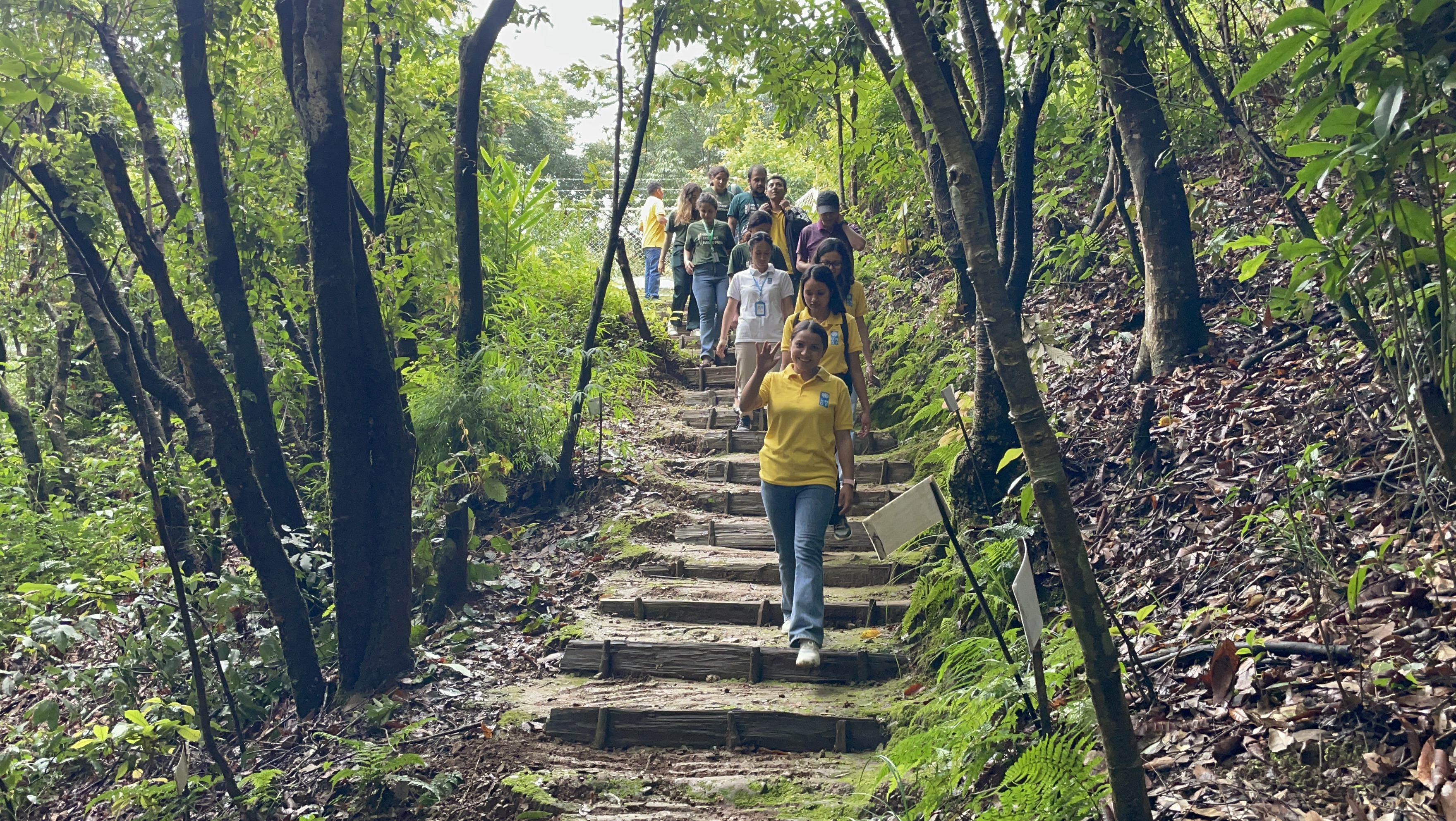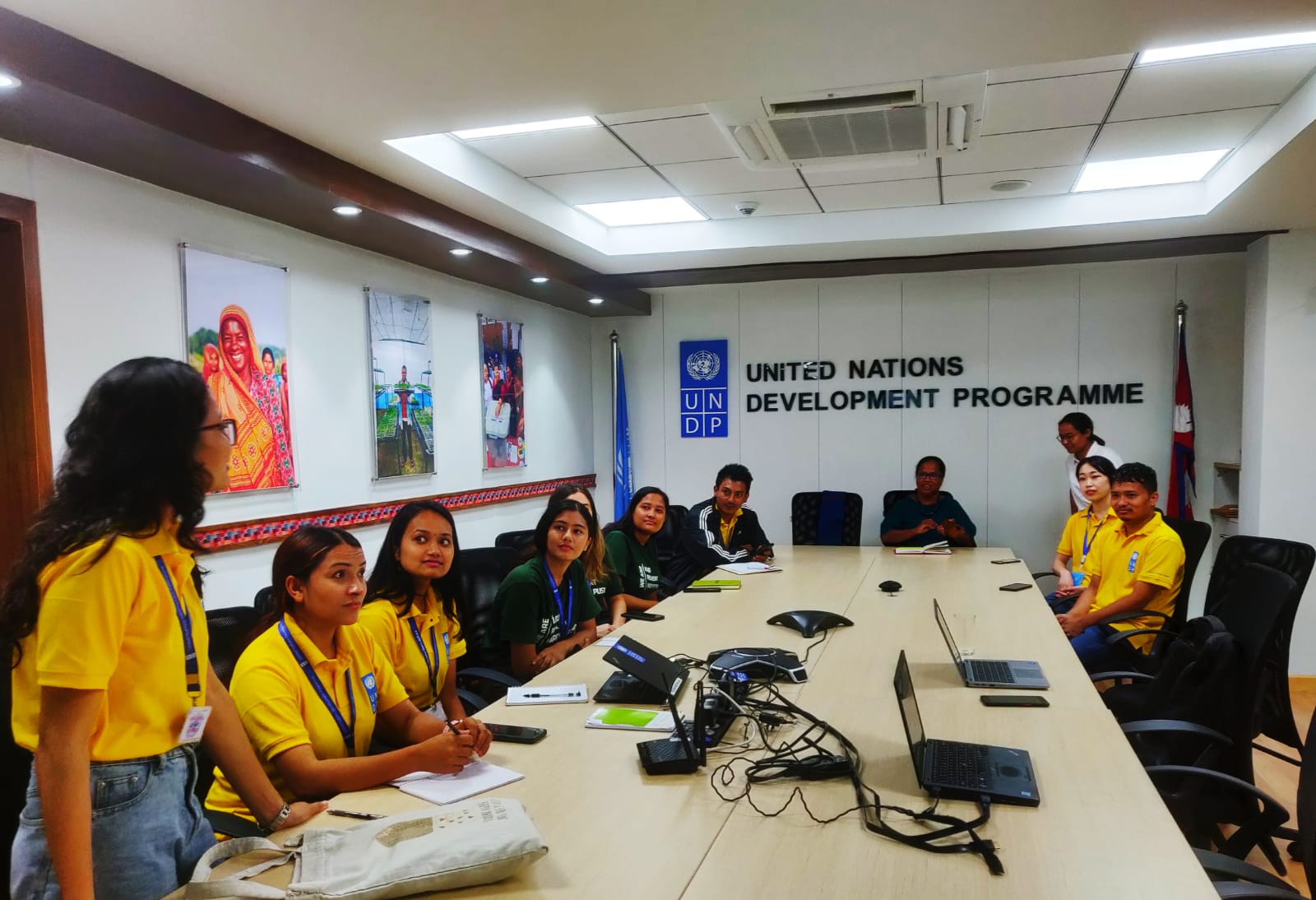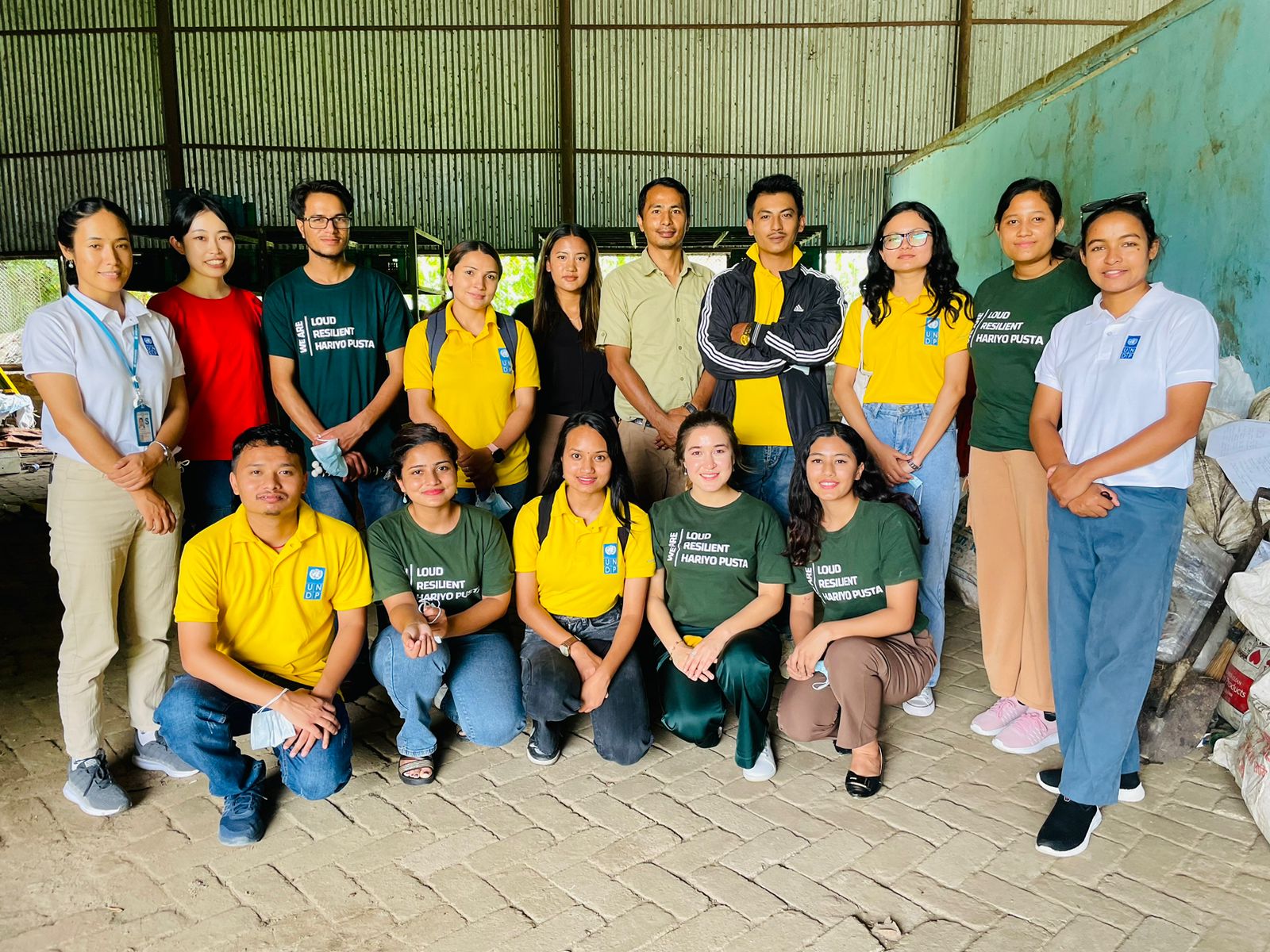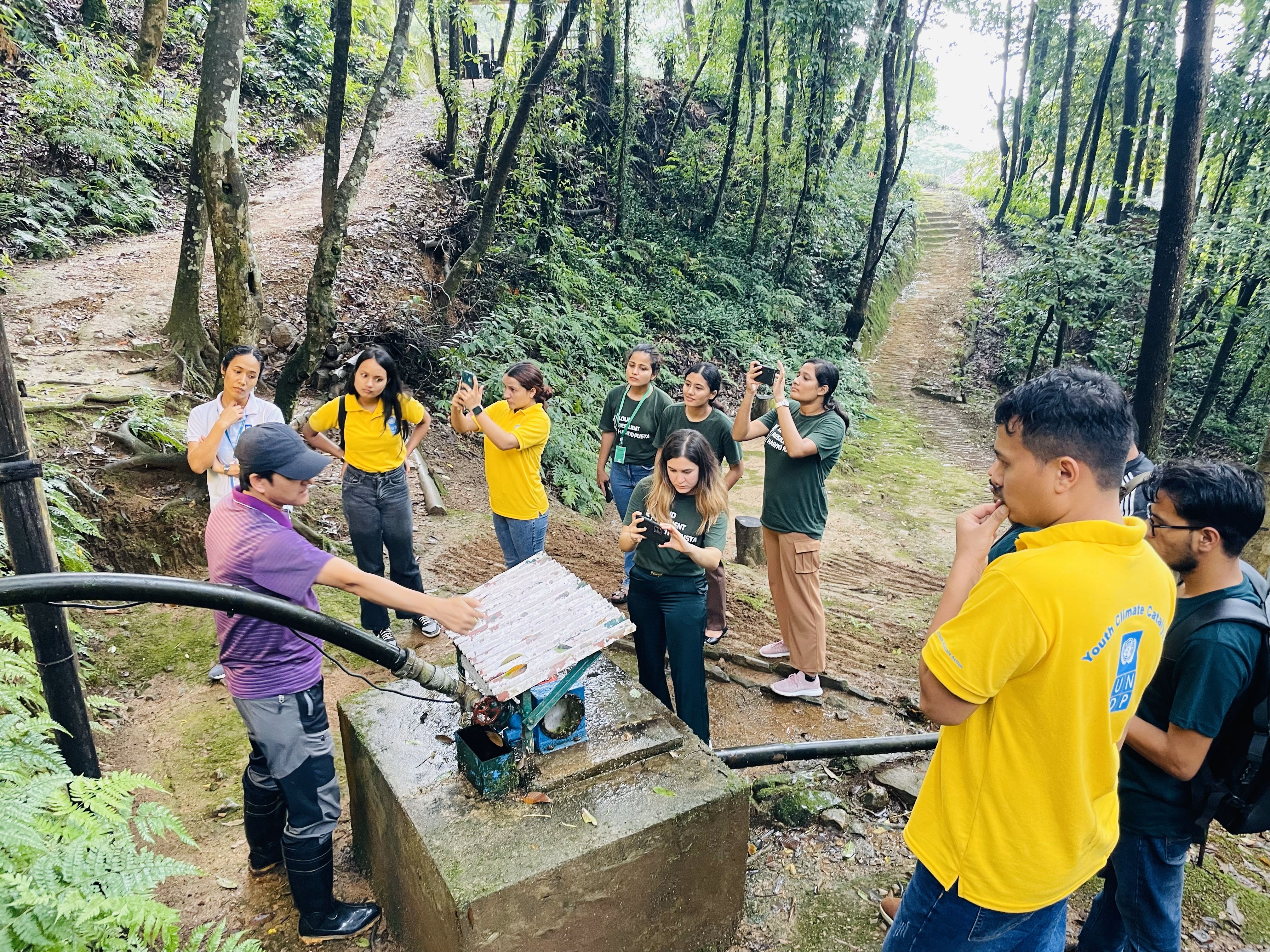A Green Excursion
December 11, 2023

The sun greeted us warmly on this year's International Youth Day 2023, as we buckled up for our green excursion. Gathered were the Hariyo Pusta and Youth Climate Catalysts, ready to embark on a day excursion of green exploration and discovery.
Hariyo Pusta and Youth Climate Catalyst are two youth-led climate initiative of United Nations Development Programme Nepal with shared aim to enhance leadership and technical capacity of young individuals. The mission- expanding youth networks to serve as catalysts for effective policy advocacy, identifying green solutions and scaling up climate actions at the community level.
Our excursion began at UNDP Nepal with an enlightening conversation with Ms. Ayshanie Medagangoda-Labe, the Resident Representative of UNDP Nepal. Ms. Labe shed light on the theme for this year, "Green Skills." In her engaging discussion, she articulated what acquiring green skills truly meant for youths like us. "Green skills were not just a set of abilities; they embodied knowledge that served as a powerful tool to enhance and contribute value to our lives and the world around us” she added.

During the interaction, Ms. Labe drew our attention to the legacy of environmentalist Rachel Carson, whose groundbreaking book "Silent Spring" had sparked a global movement against the use of DDT (dichloro-diphenyl-trichloroethane) and awakened environmental consciousness. DDT, initially developed as potent insecticides in the 1940s, had far-reaching impacts, both as a solution to insect-borne diseases and a threat to the environment. Through Carson's story, Ayshanie emphasized the transformative impact that individuals, especially young people, could have in safeguarding the environment.
Her words resonated deeply within us, setting the tone for a day of exploration, learning, and renewed commitment to making a positive impact on the environment. We set off on our journey with a celebration of our youthful energy and a shared responsibility to protect and preserve the environment. What better way to mark this occasion than by immersing ourselves in the beauty of nature that connects us with the very essence of life!

Our first destination was Blue Waste to Value (BW2V) facility, situated on the outskirts of Kathmandu, in Sakhu. BW2V is a social enterprise dedicated to the sustainable management of municipal solid waste, creating value from what was considered as refuse. Jenson Maharjan, the Operation Manager, welcomed us with enthusiasm and explained the operation of the facilities. He passionately answered our questions with insight, leaving us inspired and eager to learn more.
"Lack of awareness among community members regarding the importance of waste segregation is a major challenge," he explained. In addition to addressing this issue, he also emphasized the need for increased youth engagement in waste management. To achieve these goals, BW2V has been providing voluntary training programs, including household waste segregation, and turning organic waste into compost fertilizer, to empower individuals and communities with the knowledge and skills necessary for sustainable living.
Additionally, we had the opportunity to explore the composting technique, a process that begins with the collection of degradable and non-degradable waste from surrounding areas, following a specific schedule. These materials were then carefully separated, with the degradable waste being utilized to create compost through a series of steps. The initial phase involved cutting the organic waste into small pieces, placing them in separate containers, and periodically turning the waste until it was converted to compost. Participating in and learning from these activities not only enhanced our knowledge but also provided deeper insights into composting, recycling, reducing, reusing, and turning waste into value.
Moreover, we discovered that UNDP’s Accelerator Lab in Nepal has been collaborating with local governments, private sectors, CSOs and youth to promote upcycled products, one of the examples being benches made from recycled shampoo bottles together with BW2V and Kleanit Upcyclers Nepal.
We want to take this moment to emphasize our role as youth, which extends beyond passive observation. We are active participants with the potential to become powerful agents of change. We possess the energy, creativity, and determination needed to make a real impact on our environment, starting from our homes.

Our next destination was the Living Mountain Lab of ICIMOD, nestled away from the bustling streets of Kathmandu, amidst the lush greenery of Godavari. This lab serves as a dynamic hub of science, technology, and community collaboration, designed to address the challenges faced in mountainous regions. As we wandered through the open green lab, we observed sustainable technologies developed in collaboration with local communities such as SALT (Sloping Agriculture Land Technology), solar-powered irrigation systems, innovative waste management solutions, and energy-efficient improved cooking stoves, early warning system and rainwater harvesting systems. These tangible examples showcased the harmonious convergence of science and traditional knowledge, yielding positive changes in our environment.
Walking through the lab, we felt like our high-school and bachelor's level science curriculum had come to life. This is a must-visit learning hubs for all students, regardless of their faculty. One innovation that left a lasting impression was PST - Peltric Set Technology (200 Watts), capable of providing electricity to rural and remote areas, especially in mountainous regions. PST comes with positive environmental and efficiency implications, harnessing the energy of small streams and rivulets with a small discharge, ideal for our country’s hilly regions. As we marveled at this innovation, a fellow friend reminisced about his school days when he had to study under dimly lit kerosene lantern. This simple yet impactful technology could be replicated in rural and remote areas where students still do not have access to electricity. Each innovation we encountered marked a step towards reducing our environmental footprint and enhancing community resilience.
The one-day excursion into the heart of nature served as a rejuvenating escape from the relentless pace of our daily lives. We couldn’t help but reflect on our individual roles in preserving the environment. It was a reminder of the pressing need to reduce our environmental footprint and actively support initiatives dedicated to the preservation of the ecosystems. We concluded the day with a sense of renewal, carrying with us a deepened commitment to cherish and protect the natural beauty of our planet for the benefit of future generations.
About the authors
Bidhya Pandey (Hariyo Pusta, Tilottama Municipality
Monika Koirala (Youth Climate Catalyst, Waling Municipality)

 Locations
Locations



